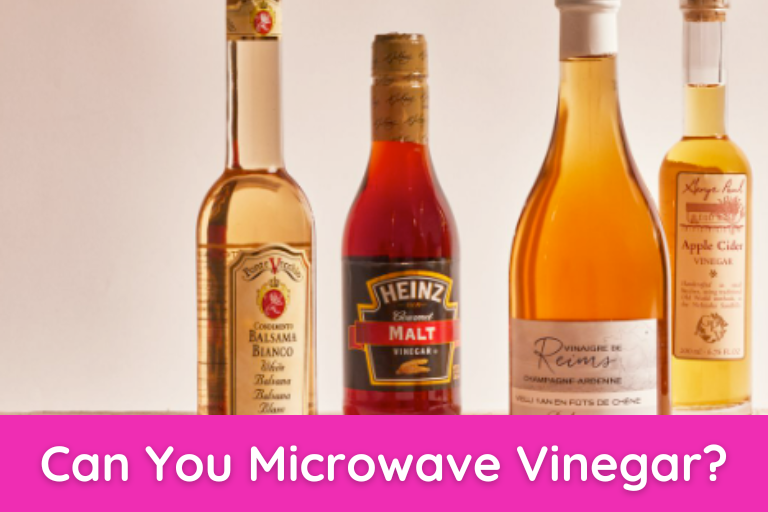Microwave ovens have become an integral part of our kitchens, allowing us to heat up and prepare various food items quickly. However, certain substances raise questions regarding their compatibility with microwaves.
One such substance is vinegar. In this blog post, we will delve into the topic of microwaving vinegar and explore whether it is safe or advisable to do so.
Understanding Vinegar:
Vinegar is a versatile liquid made through the fermentation of ethanol by acetic acid bacteria. It is commonly used in cooking, salad dressings, pickling, and cleaning due to its acidic nature. Vinegar’s chemical properties make it an interesting substance to investigate regarding microwave heating.
The Microwave Oven:
Before we dive into the specifics of microwaving vinegar, let’s briefly understand how microwave ovens work. These appliances use microwave radiation to heat food by agitating water molecules within the food, generating heat. However, not all substances are suitable for microwaving, and caution must be exercised.
Can You Microwave Vinegar?
Microwaving vinegar poses some potential risks and dangers. When heated, vinegar can release vapours and odours that may be strong and unpleasant. These vapours could irritate the respiratory system or even cause allergic reactions in some individuals. Additionally, the acidity of vinegar may damage the interior of the microwave, including the turntable and the cavity, especially if the vinegar is concentrated or overheated.
Alternative Uses for Vinegar in the Microwave:
- While microwaving vinegar may not be advisable, there are alternative ways to use vinegar in the microwave. For example, vinegar can be used as a natural cleaning agent to remove stains, grease, and odours from the microwave.
Mixing vinegar with water and heating it in a microwave-safe bowl can help loosen stubborn food particles, making them easier to wipe away. This alternative use allows us to benefit from vinegar’s cleaning properties without risking damage to the microwave.
FAQ:
Is it OK to heat vinegar?
Heating vinegar is generally safe, but it can release strong vapours and odours that may be irritating. It is important to exercise caution and avoid overheating vinegar, as it can cause damage to the microwave and affect its performance.
How long do you microwave vinegar?
The microwave time for heating vinegar can vary depending on the desired temperature and quantity. It is recommended to start with short intervals, typically around 30 seconds, and check the temperature regularly to prevent overheating.
How long to steam vinegar in the microwave?
Steaming vinegar in the microwave can be done by heating vinegar and water in a microwave-safe bowl and heating it. The duration will depend on the desired level of steam. A common guideline is to heat the mixture for 3-5 minutes, but it is crucial to monitor it closely to avoid excessive steam or boiling.
Can you microwave acetic acid?
It is not recommended to microwave pure acetic acid. Acetic acid is a strong acid, and heating it can be dangerous, releasing harmful vapours and potential damage to the microwave. It is best to avoid microwaving pure acetic acid and stick to dilutions like vinegar for safe use.
Is vinegar heat sensitive?
Vinegar is not particularly heat-sensitive but can release vapours and odours when heated. It is advisable to avoid prolonged or excessive heating to prevent potential damage to the microwave and ensure a safe environment.
Does vinegar work better when hot?
Vinegar’s effectiveness in various applications, such as cleaning or cooking, does not necessarily depend on its temperature. However, warm vinegar may have enhanced cleaning properties due to the increased mobility of its molecules. Nonetheless, always follow specific recipes or instructions for the best results.
Why put vinegar in the microwave?
Vinegar is often used in microwaves for cleaning purposes. The steam generated by heating a mixture of vinegar and water helps loosen food particles and grime, making it easier to wipe away. Vinegar can also help eliminate odours from the microwave.
Can you microwave vinegar and water?
Yes, you can microwave a mixture of vinegar and water. This combination is commonly used for cleaning and deodorizing the microwave. Be cautious not to overheat the mixture and follow recommended guidelines for safe use.
Can you microwave vinegar and soap?
It is not advisable to microwave a mixture of vinegar and soap. Combining vinegar’s acidity and soap’s composition may result in unwanted reactions or foaming. For cleaning purposes, using vinegar and water without adding soap is better.
What happens when acetic acid is heated?
When acetic acid is heated, it can vaporize and release strong fumes. Overheating or boiling acetic acid can cause a significant release of vapours, which may irritate the respiratory system. It is crucial to handle acetic acid carefully and avoid unnecessary heating.
Is acetic acid harmful if swallowed?
Swallowing concentrated acetic acid can be harmful and potentially corrosive to the throat, esophagus, and stomach tissues. It is essential to seek immediate medical attention if acetic acid is ingested and follow the advice of a healthcare professional.
Is acetic acid harmful in food?
When used in appropriate amounts as vinegar in food preparations, acetic acid is generally safe for consumption. However, consuming concentrated acetic acid directly can be harmful. It is crucial to use acetic acid in food applications within recommended limits and follow proper handling and storage practices.
Conclusion:
In conclusion, while vinegar is a common household ingredient with numerous uses, microwaving it can be risky. The release of vapours and the potential damage to the microwave oven make it advisable to avoid heating vinegar directly in the microwave.
However, alternative ways exist to utilize vinegar’s cleaning properties in the microwave safely. Mixing vinegar with water and following recommended guidelines can effectively clean your microwave and avoid potential harm.
Always exercise caution and follow manufacturer guidelines when using your microwave oven. Understanding the compatibility of different substances with microwaves is essential to ensure the appliance’s safety and well-being.




